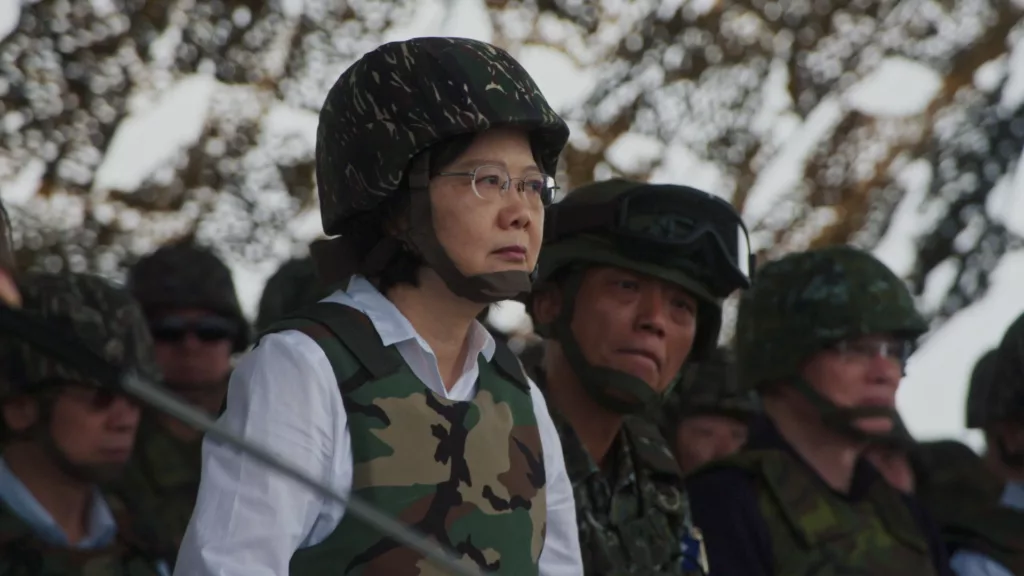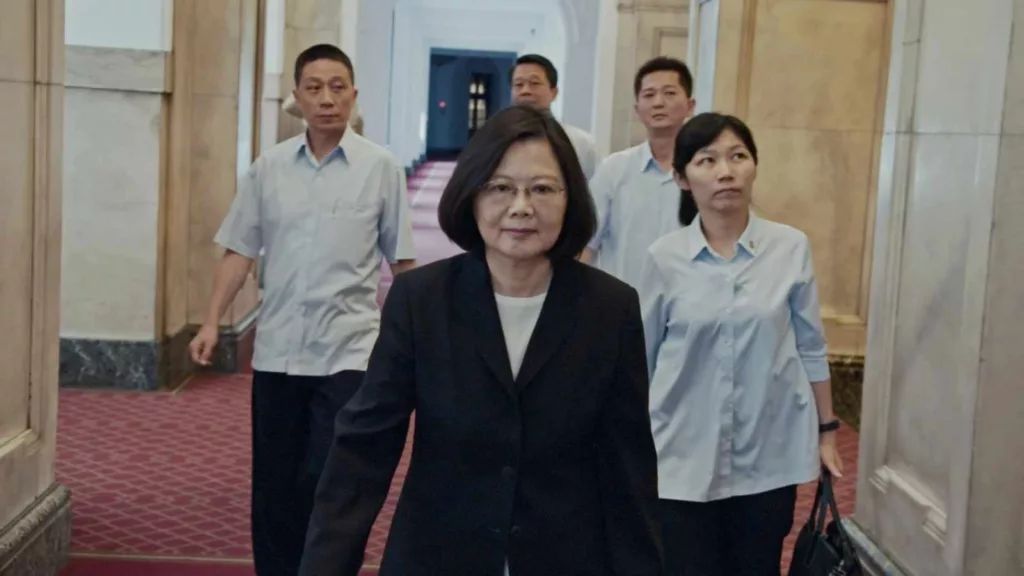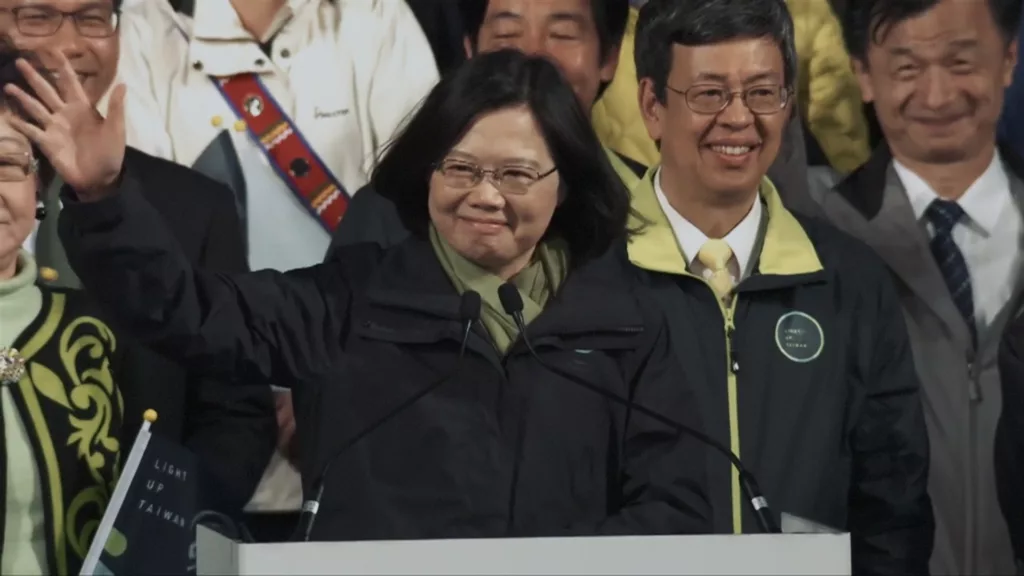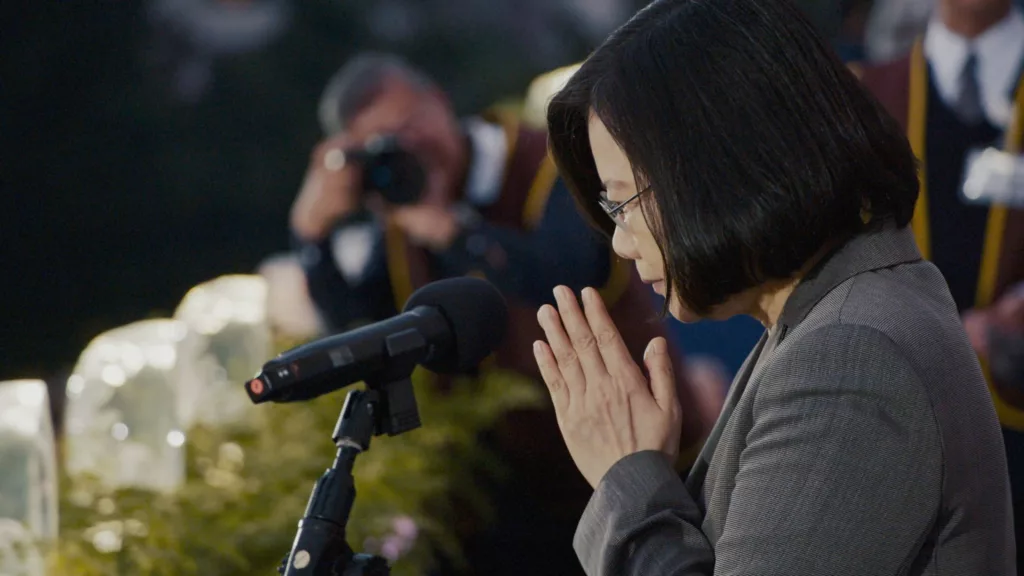Nestled off the coast of southeast China lies a little island with a big story, and Vanessa Hope’s documentary Invisible Nation tells it engagingly. Through interviews with activists, politicians, and everyday folk, we learn how Taiwan transformed from brutal martial law to flowering democracy, not once but twice emerging as a regional beacon. Yet independence brings isolation as its giant neighbor asserts control.
Once ruled under the Kuomintang’s “White Terror,” Taiwan kicked off reforms in the late 1980s. Freedoms grew as youth demanded dignity. Divided families became whole, and a new identity took shape. However, history casts long shadows. Just as Ukraine awoke from domination, the people of Taiwan saw Hong Kong silenced and wondered, “What next?”
Enter politician Tsai Ing-wen. Through a grassroots effort, she became Taiwan’s first female leader. Leading with quiet conviction, Tsai balances defending autonomy with avoiding aggression. Her charisma inspires, yet she remains approachable in glimpses of everyday life. Through her story and others, Hope gives a human face to geopolitics as democracy faces its latest challenge.
By centering voices from both sides of the strait and abroad, Invisible Nation presents a rounded look at this complex issue. We learn how global realities shape local lives and vice versa. Though certain explorations could go deeper, as an introduction to Taiwan’s dynamic present and uncertain future, this film hits its mark. One leaves hoping this island and its vibrant culture can remain guided by the democratic spirit that has brought them this far.
The Shaping of a Nation
Taiwan has experienced a turbulent past that has profoundly impacted its present circumstances. For centuries, the island was colonized by various foreign powers, each leaving their mark on its land and people.
The Dutch first established a settlement in the 17th century, followed by Spanish control soon after. But it was under two centuries of Qing dynasty rule from China that Taiwanese identity began taking greater form. The island existed briefly as the Republic of Formosa in the late 19th century before coming under Japanese rule from 1895 to 1945.
When the Chinese Civil War ended in 1949, Chiang Kai-shek’s defeated nationalist Kuomintang party retreated to Taiwan. The Kuomintang governed as an authoritarian regime under martial law and promoted the idea that Taiwan was temporarily administering China. This caused significant resentment among native Taiwanese.
Through the mid-20th century, Taiwan industrialized rapidly but remained tightly controlled by the Kuomintang. Dissent was suppressed, and democracy was a distant dream. Things began to change in the late 1980s as the Taiwanese people mounted a successful democratic movement advocating for civil liberties, political reforms, and a separate Taiwanese identity.
The end of martial law in 1987 and the first direct presidential election in 1996 set Taiwan irreversibly on the path of multi-party democracy. Today, it stands as one of Asia’s most progressive societies. But this democratic awakening has brought increased foreign pressure as neighboring China refuses to accept Taiwan’s self-rule.
The island’s complex colonial and authoritarian past continues to shape its modern quest for international recognition and defense of its hard-won freedoms. Taiwan’s story is a testament to both the resilience of the democratic spirit and the ongoing struggle for independence.
Walking a tightrope
Caught between two powerful forces is a tricky position to be in. Just ask Taiwan. For decades, the island nation has had to expertly navigate rising tensions with an increasingly assertive China while maintaining good relations with allies like the United States.
At the heart of the issue is China’s rigid “One China” principle, which refuses to acknowledge Taiwan as a sovereign country. Instead, Beijing claims the territory as an inherent part of China, awaiting “reunification” by force if necessary. It’s a stance that has left Taiwan internationally isolated despite a functional democracy far removed from authoritarian China.
Without UN membership or formal diplomatic ties to most countries, Taiwan is excluded from important bodies like the World Health Organization. Even its name is suppressed, as at the Olympics, where competitors must compete as “Chinese Taipei.” It amounts to Taiwan being regularly written out of the global picture to appease China.
The consequences go beyond hurting pride. When the COVID pandemic emerged, Taiwan struggled to access vital health information from the WHO due to its frozen status. And Beijing’s increasing influence means Taiwan loses allies almost annually as nations flip recognition to the far larger Chinese market.
Militarily, the nose also feels tighter. Provocative warplane flights and missile tests into Taiwan’s airspace and waters have become commonplace Chinese tactics to intimidate. Beijing’s defense budget now dwarfs Taiwan’s several times over. Some read recent events in Ukraine as a trial for how far China may one day pursue Taiwan.
Yet give Taiwan credit; it has long expertly walked this tightrope. While asserting its independent identity, it treads carefully to avoid full-fledged conflict. When not recognized as a nation, Taiwan maintains a careful balance in international relations too.
Though challenging, Taiwan’s position remains one envied by those suffering under Chinese Communist rule. And so long as democracy stays strongly rooted, with wisdom and allies, there’s hope this tightrope will hold against anyone who’d like nothing more than to sever it.
Steadfast Leadership
Invisible Nation shines a light on Taiwan’s perseverance in the face of strong opposition. At the heart of it all is President Tsai Ing-wen. Through conversations with Hope, we gain insight into her background and determination to guide Taiwan forward.
Born in Taipei, Tsai’s journey to the presidency was unlikely. Starting as an archaeologist, she found her calling in law and politics after moving to America for university. We see snippets of her early days advocating for Taiwan’s self-governance. From there, she steadily climbed the ranks over many years.
Beyond profiles of Tsai, the film incorporates a breadth of voices. Academics, activists, politicians, and more offer context on Taiwan’s turbulent history and ongoing challenges. They explore the various rulers that shaped the island and explain modern tensions as China refuses to acknowledge Taiwan’s independence.
Through it all, Hope’s straightforward documentary lets the story unfold without narration. We move between interviews and are shown Taiwan, both past and present. Her style allows complex issues to be conveyed clearly and leaves space for the audience to reflect.
While providing a helpful background, Invisible Nation saves its highest praise for Tsai’s steady leadership. Facing intensifying pressure, she continues Taiwan’s democratic path with resolve. Her interview segments reveal not just her political resolve but also her lighter personal side. This adds depth and makes her conviction all the more inspiring.
Overall, the film shines a deserving light on Taiwan’s determination to freely decide its destiny. And through Tsai Ing-wen’s direction, there remains hope that steady governance can weather even the strongest of storms.
Spotlight on Taiwan’s Precarious Position
Invisible Nation shines a light on several important themes regarding Taiwan. Firstly, it captures the nation’s development into a strong democracy over the past decades. After enduring martial law for years, Taiwan has made huge strides in civil liberties and political freedom. The film rightfully highlights this democratic transformation as quite remarkable.
We also see Taiwan’s burgeoning national identity, which stems from its complex history but has truly blossomed with self-governance. Today, most Taiwanese feel their culture and society differ greatly from China. The country has become a leader in Asia on social issues like same-sex marriage as well. Through interviews, the drive for Taiwanese people to decide their own path apart from mainland China really comes through.
Of course, this budding identity is what makes Taiwan’s position so precarious. As we learn, China refuses to acknowledge Taiwan as a truly independent nation. Their increasingly forceful rhetoric and military positioning aim to bring Taiwan under Chinese rule once more. The documentary doesn’t shy away from these concerning realities.
In fact, it draws comparisons to recent events in Hong Kong and Ukraine that add greater urgency. Both serve as warnings of what could become of Taiwan if it loses its autonomy. The film leaves us questioning how far China might go to exert control and what another invasion could entail.
Finally, Invisible Nation explores Taiwan’s alliance with the United States. On one hand, US support helps deter direct Chinese action. But American reluctance to fully endorse Taiwan’s sovereignty also contributes to its vulnerability. Through it all, one thing is clear: Taiwan’s fate remains closely tied to the actions of much larger powers.
In closing, the film illuminates Taiwan’s inspiring journey and equally serious challenges of simply living as a de facto independent nation in current times. It profiles a thriving culture that finds itself in an uncertain, potentially precarious position.
Capturing Powerful Personal Perspectives
Vanessa Hope crafted Invisible Nation to not only inform audiences but stir discussion on Taiwan’s challenges. Interweaving historical overviews with present-day perspectives, certain elements really resonate.
By focusing on individual Taiwanese voices, the film humanizes complex issues. Seeing former dissident Chen Cheng reflect on her imprisonment is moving. As someone who endured the Kuomintang’s oppression, her viewpoint carries weight. Young activists like Freddy Lim also bring fresh energy, fighting for their culture despite censorship pressures.
These intimate stories complement macro-discussions. While political experts and leaders provide the necessary context, the documentary remains grounded in personal narratives. Ordinary citizens experiencing Taiwan’s journey first-hand, from authoritarianism to democracy, lend profound understanding. Their passion for preserving hard-won freedoms comes through loud and clear.
Presenting multifaceted viewpoints has undeniable educational merit too. By crafting a more well-rounded portrait, Invisible Nation enables audiences worldwide to engage more thoughtfully with this topic. Insights from diverse figures, whether politicians, scholars, or artists, strengthen the film’s impact.
Hope’s ability to facilitate open forums continues at festivals too. Screenings have sparked lively panel talks across disciplines. With promotion on college campuses especially, the documentary motivates younger generations to consider geopolitical ripple effects that don’t always make headlines.
While raising awareness, Invisible Nation issues an implicit call to stand with Taiwan in exercising self-determination. By humanizing citizens’ defense of basic rights, the film challenges inaction over its diplomatic isolation and military threats to its existence. An independent Taiwan deserves global support for the robust democracy it has built.
Through weaving personal stories into the political fabric, Vanessa Hope’s documentary illuminates Taiwan’s reality in a way statistics alone cannot. In giving regular people prominence, Invisible Nation finds the emotional and educational power to move thoughtful discussion forward.
Carrying Taiwan’s Story Forward
Vanessa Hope’s documentary shines a light on Taiwan’s rich history and uncertain future, which more people deserve to know. Invisible Nation covers so much ground, from centuries of occupation to Taiwan’s inspiring democratic journey. And by focusing on everyday citizens, it shows us that big issues affect real lives.
Through archive footage and interviews, Hope pieces together Taiwan’s complexity. We learn how its identity and autonomy face constant challenges despite building a flourishing society. And she highlights how one country’s fate can influence others, making Taiwan’s situation everyone’s concern.
By spotlighting President Tsai’s leadership through unprecedented access, Hope also reveals a thoughtful, determined politician. Tsai works tirelessly to advocate for Taiwan, stay engaged globally, and ensure security—no easy tasks given the pressure Taiwan endures. Her calm determination and that of Taiwan’s people are inspiring.
While Hope could have explored some dynamics more deeply, her film serves an important purpose by spreading awareness. With grave issues at hand, that may be its greatest achievement. Invisible Nation urges viewers to pay attention to an issue that affects democratic ideals worldwide. It’s a call to stand in solidarity with Taiwan and safeguard the freedoms it has established.
Ultimately, Hope presents a moving portrait that keeps Taiwan’s story in focus. Long may its spirit continue to carry forward through educational works like this and the actions of allies worldwide. There is still progress to be made, but films such as Invisible Nation are an instrumental part of the journey.
The Review
Invisible Nation
Invisible Nation sheds necessary light on Taiwan's complex path and uncertain future and deserves wider exposure for its educational value. While not perfect cinematically, Vanessa Hope's documentary accomplishes the vital job of informing more people about Taiwan's rich culture and history and the challenges to its autonomy. By humanizing everyday citizens' perspectives, it issues an impassioned call for global solidarity.
PROS
- Provides a comprehensive yet accessible overview of Taiwan's history and political situation
- Features insightful interviews with important figures, including President Tsai Ing-wen
- Succeeds in bringing Taiwan's story to international audiences
- Highlights: shifting Taiwanese identity and democratic development
- Humanizes complex issues through individual Taiwanese voices
CONS
- Could have incorporated more stylistic filmmaking techniques
- At times, it overrelies on talking heads without sufficient supplemental footage
- Fails to critically examine some domestic issues within Taiwan
- Lack of analysis of economic relationships and business pressures






















































Discussion about this post